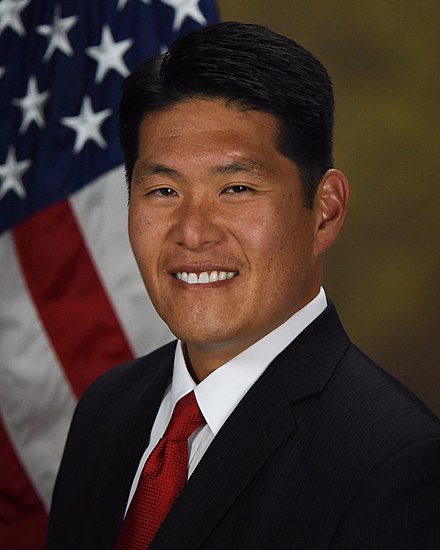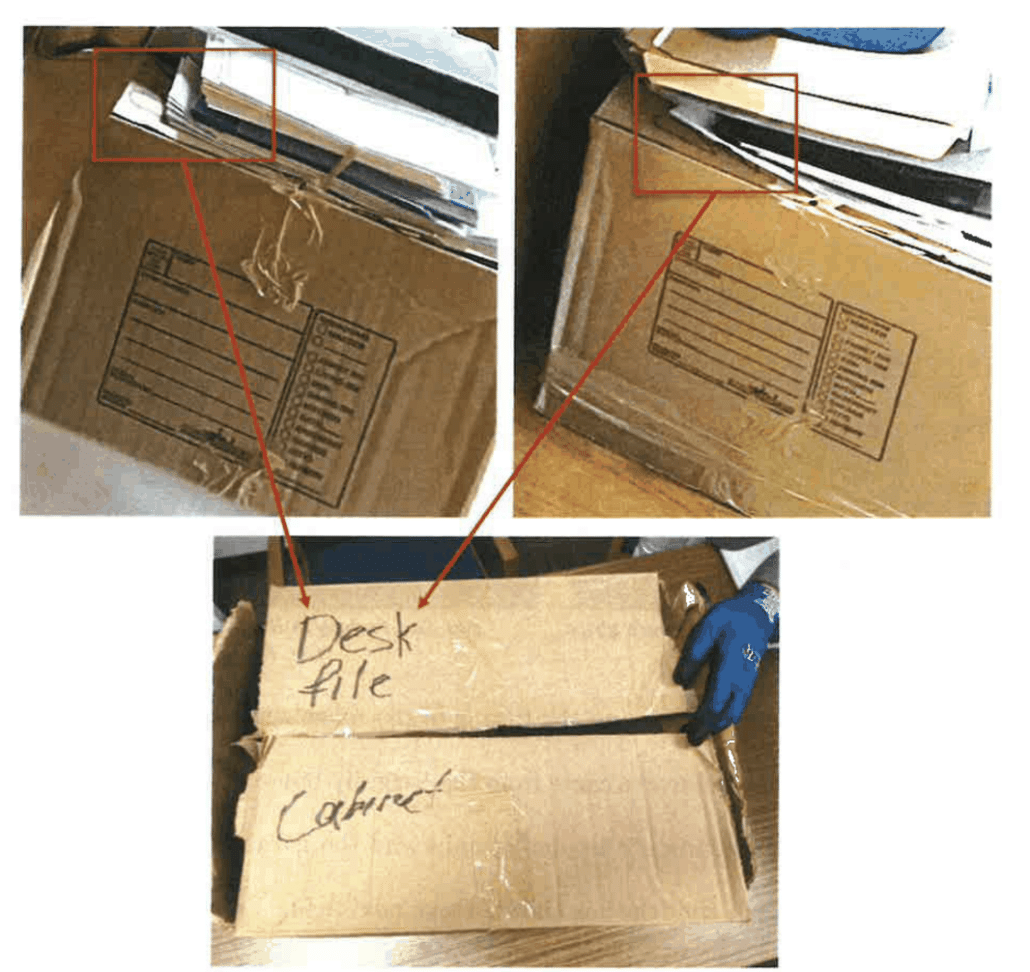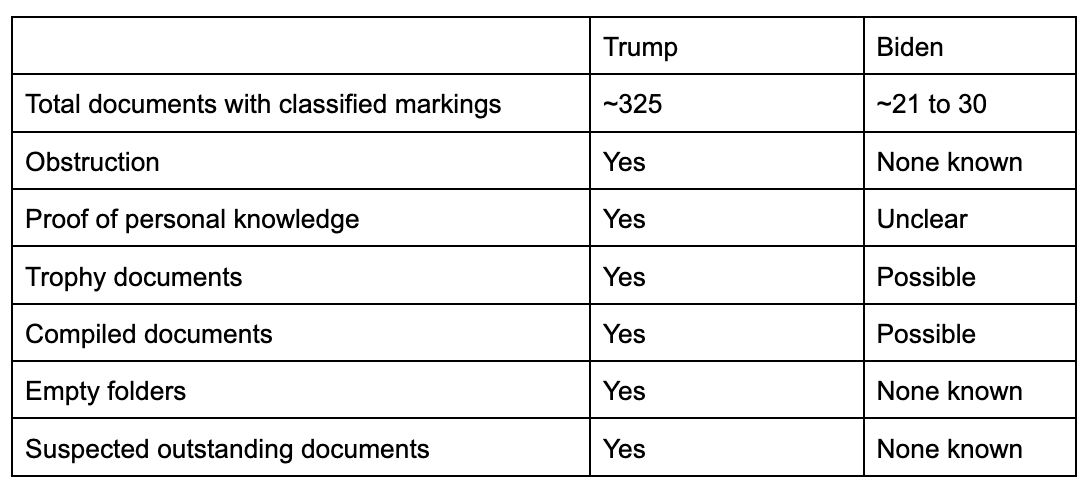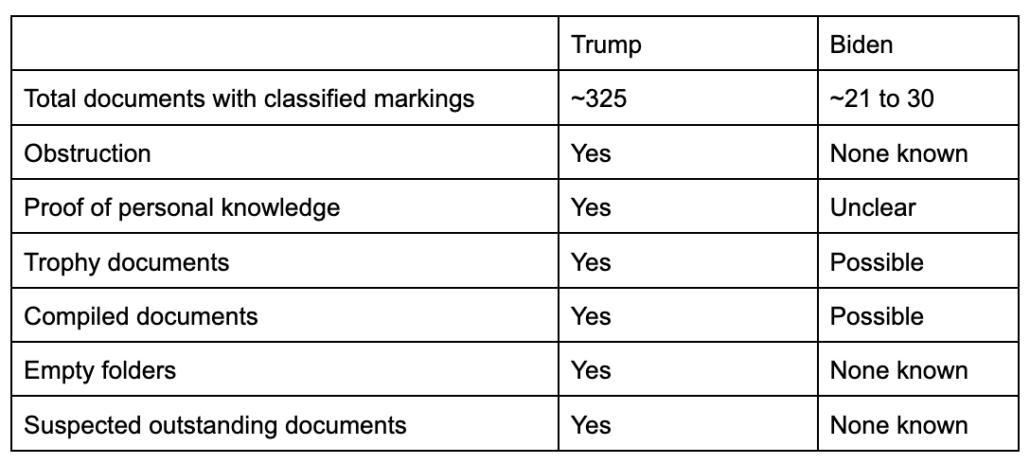How Alleged Geezer Joe Biden Caught Rob Hur and Marc Krickbaum Trying to Sandbag Him
I was giggling during much of the atrocious Robert Hur hearing yesterday. Just as it started, House Judiciary Democrats released the transcript of the Joe Biden interview (October 8, October 9). It’s the kind of no-advance release that Sarah Isgur (whom Hur paid to be his spox for the hearing) did while at DOJ, most notably with the texts of Peter Strzok and Lisa Page. It was particularly damaging to Hur that when he denied that, in his interview, Biden had correctly and forcibly stated the date of Beau’s death, the transcript was out showing that’s a lie.
But it also meant that as Hur was spending hours (fewer than the combined length of his Biden interview, though) defending calling Biden an old geezer, people were reading the transcript and seeing that he misrepresented Biden’s acuity.
The transcript is more important, however, for the way it shows that Hur — and even more so, another former Trump US Attorney, Marc Krickbaum — came into that interview with a theory of Biden’s criminal wrong-doing, repeatedly tried to sandbag the President into admitting culpability, only to have the old geezer point out their logical flaws.
Generally, the plan for the interview went like this:
- Biden’s transition from VP to private citizen
- Map of the houses
- Specific furniture from 2017 in Chain Bridge and 2019 in Wilmington
- The notebooks and the filing cabinets and the ratty box
- [Break for the day]
- Clarification about when Biden did send marked documents back
- The Thanksgiving Memo
- Confidential memo in back
- Zwonitzer interview and 8 words out of 33 words
- How and why he had just returned marked documents
- His notebooks
- The Afghan docs
- Tranches of deliveries to the garage
- Penn Center general
- Penn Center specific
- Naval Observatory meeting
On the first day, they got Biden to explain how he managed the 2017 transition and where stuff, especially furniture, was in both his existing Wilmington house and a house he rented in Virginia from 2017 to 2019 that they call Chain Bridge. It ended with a review of the box from the garage, what both men were desperate to make a smoking gun.
Much of the second day, in which Krickbaum took the lead, focused on trying to get Biden to endorse their theory that Biden had taken the Afghan documents home because he wanted to write a book on them. He debunked that theory, but they nevertheless put it into the report anyway.
The part of the report where they laid out this theory is riddled with false claims.
In the same box in the garage where FBI agents found the classified Afghanistan documents, agents also found other documents of great personal importance to Mr. Biden, including photos of his son Beau and documents Mr. Biden filed, accessed, and used in early 2017, during the same time he told Zwonitzer found the classified documents about Afghanistan in his Virginia home. 825 The evidence suggests that Mr. Biden maintained these files himself.
Mr. Biden had a strong motive to keep the classified Afghanistan documents. He believed President Obama’s 2009 troop surge was a mistake on par with Vietnam. 826 He wanted record to show that he was right about Afghanistan; that his critics were wrong; and that he had opposed President Obama’s mistaken decision forcefully when it was made-that his judgment was sound when it mattered most. 827
This evidence provides grounds to believe that Mr. Biden willfully retained the marked classified documents about Afghanistan. If he was not referring to those documents-later found in his garage-when he told Zwonitzer he had “just found all the classified stuff downstairs,” it is not clear what else Mr. Biden could have been referring to. 828
825 See Chapters Five and Six.
826 See Chapter Six.
827 See id.
828 See Chapters Five and Six
The photos of Beau were campaign photos, not personal photos. There was a good deal of administrative files in the box, which Biden pointed out in his letter, he didn’t manage himself. The report doesn’t even present proof that Biden was accessing all those files in 2017 and — as Hur himself admitted — there were files from much earlier and much later.
Since Biden had the memo he wrote himself, there was no reason to keep all the other documents. The memo was better exoneration, as it was proof not only that he was right, but that he warned President Obama in advance, the only memo of the kind he sent Obama, he claimed. And the claim that “it is not clear what else Mr. Biden could have been referring to,” is sheer fantasy. By context — the context they only provided once in the report — it was a specific reference to the memo, which (as they also showed) would have been found stuck in one of the notebooks Biden was using in the interviews.
As I laid out here, nothing about this theory ever made sense!
And, as I noted, this discussion cites to the chapters of the report I’ve called novelistic, which incorporate direct testimony only from Ron Klain. This is the theory that Hur himself describes as “reading into” the facts of the case.
But now look at how Hur and Krickbaum came into those interviews with a determination to get Biden to admit to it anyway.
On the first day, Hur led Biden through a discussion of the box and its contents (remember: the FBI put the documents into a new box out of order, and they did all questioning on documents based on photos, which were often hard to read). Biden repeatedly said that, given that there was such a mix of things in the box, someone probably just shoved them all in together.
Hur: But do remember how these materials got into the box and then how that box got into the garage?
Biden: No, I don’t remember how it got — I don’t remember how a beat-up box got in the garage.
[snip]
Somebody must’ve, packing this up, just picked up all the stuff and put it in a box, because I didn’t.
[snip]
See, that’s what makes me think just people gathered up whatever they found, and whenever the last thing was being moved. So the stuff moving out of the Vice President’s residence, at the end of the day, whatever they found, they put — they didn’t separate it out, you know, Speakers Bureau or whatever the hell it is, or Beau. They just put it in a single box. That’s the only thing I can think of.
[snip]
But my guess is that they — based on the dates, they were Vice Presidential material initially. They got put in a box and probably got sent — either to the Penn Center or to Chain Bridge Road or, for some reason, got sent up to Wilmington. [my emphasis]
At this point, Bob Bauer interrupted and noted that Hur was supposed to be asking Biden what he remembers, not asking him to engage in “detective work” about how things may have ended up where they did.
Bauer: But to be clear, your question is whether he knows —
Hur: Correct.
Bauer: — has a clear recollection of how they —
Biden: No, I have no idea.
Bauer: got [muddled] Okay.
Hur: Correct.
Bauer: I want to make sure it’s clear.
Hur: But it’s also helpful if he has thoughts as to how —
Bauer: Well, I mean, I’d like to stay with his recollection and not put him in a position where he has to speculate or —
Hur: Understood.
Bauer — create assumptions or try to engage in detective work.
Biden started looking at something and Hur brought him back to the box.
Hur offered up — literally asking Biden to endorse their theory — that because there are not other boxes with file folders in the garage, the materials in the box must have come from two file cabinets in another room, at least one of which came from Chain Bridge.
Hur: So just going back and forth, there’s blue hanging file folders, there’s some red manila folders, there’s yellow manila folder, both in the garage box and in the lower drawer of the cabinet in the den — in the pool table room. So it looks to us what happened was the materials that were in the box in the beat-up — the materials that were in the beat-up box in the garage, at some point, were in the cabinet in the pool table room. They got put in a beat-up box and shoved out in the garage.
Bauer was fairly incredulous at this leap of logic.
Bauer: Just for my sake, Rob, how do you — I just really — I honestly don’t quite understand.
Hur: Yes.
Bauer: These are file folders, right? They could — people buy file folders, so —
Hur: Correct.
Bauer: Why do you assume that that’s the trajectory here? I hope, I hope —
Hur: I am — I’m not assuming. I’m saying that it just —
Bauer: You said, you said it looks to us like this —
Hur: — from physical appearance. From physical appearance. So–
At this point, Biden and Bauer were looking at something entirely different. Once everyone was looking at the same picture (which, remember, is a picture of folders that were not in the same order as they had been in the tattered box, because the FBI rearranged the order on repacking), Hur tried again.
Hur: So was that material previously in the file cabinet that was in the pool table room and that is shown in FBI_0040?
Biden offered what was, to him, a more plausible explanation.
Biden: Wouldn’t it be more likely it was on a floor in the garage, they took it off the garage and put it in the file cabinet? Why would you put it out in the — unless you want to throw it away.
Hur: Well, maybe I framed this question — well, what are we trying to do is to figure out where was this stuff in the garage before it was in the garage.
Bauer interrupted again to remind Hur he was supposed to be asking Biden about what he remembers, and he had already said he didn’t know how the box got there.
Bauer: And my understanding, just to be clear —
Hur: Yes.
Bauer: because I really don’t want to be unhelpful, I want to be —
Hur: Yes.
Bauer: helpful, is I thought, unless I misunderstood —
Hur: Yes.
Bauer: His answer earlier was he doesn’t know how it got there.
Hur claimed that Biden said he did not recall how the box got there.
Hur: He doesn’t recall. And my follow-up —
Biden first said that he didn’t remember, because that’s the question Hur asked. But then he specifically said (bolded above) he did not pack up the box. That’s consistent with what he said about every other box they asked about, and consistent with the conclusion that Hur drew about the most sensitive documents found, which were at Penn Center.
Bauer intervened again and asked Hur to stop asking the President to speculate. Hur pretended he was just asking the question poorly, but repeated his theory that file folders must all come from the same place.
Bauer: And I’m worried that he’s about to start sort of analyzing speculative assumptions.
Hur: Sure. Well, let me, let me get the question out, because I’ve sort of framed it kind of clunkily here. So given the physical — given the fact that the materials in garage box 1 are different from everything else in the garage in that they’re in hanging file folders, and given their physical — you know, there are some similarities between their appearance and the stuff that’s in the file cabinet in the, in the pool table room, is it — are we wrong to think that maybe the stuff in the garage was formerly in the file cabinet?
Biden pointed out that — particularly since everything got delivered into the garage when it got moved — the opposite made more sense, that this box simply never got moved into the house. Then he repeated again, that he did not know how the box got there — not that he didn’t remember, but that he affirmatively did not know.
Biden: No no more than I think you’re wrong if it was the opposite, stuff that was in the file cabinet was in the garage.
Hur: I see.
Biden: In other words, I, I don’t have any idea.
Bauer intervened again.
Bauer: Yeah. I think —
Hur: Understood.
Bauer: I think we’re kind of going down a trail here that I find confusing. Frankly, I just —
Hur: Yes.
Biden, more plainly, stated that they’re “trying to establish something.” Ultimately, he described that he used to teach logic and pointed out that the logic of Hur’s theory was flawed.
Biden: They’re obviously trying to establish something.
Bauer: do. His recollection is his recollection.
Hur: Okay.
Bauer: and he doesn’t know how it got there.
Hur: Okay, fair enough.
Biden: No, but I, I don’t have any idea.
Bauer: Well, that’s, that’s — then that’s the answer then I think.
Biden: But I don’t know, it just — I used to teach logic. I don’t get even the assertion, but anyway, it doesn’t matter.
The guy Hur accused of being a geezer because he didn’t remember the year, but did (Hur forgot to put in his report) remember the date of Beau’s death ended up lecturing him on how dumb his theory was.
That also didn’t make the report.
The next day, Marc Krickbaum took a more active role in questioning. After walking Biden through the Thanksgiving memo Biden sent Obama to try to dissuade him from surging troops in Afghanistan — which Biden strongly explained he wanted to keep it secret because of the sensitivities of the memo, not because of classified information in it — Krickbaum tested one part of his theory. Did Biden ever think about writing a book about Afghanistan? “I give you my word I never thought about that.” Biden reviewed, for a second time, what he had wanted to write about — the inflection point in history — and Krickbaum interrupted, and Bauer interrupted him. Bauer again complained that prosecutors were asking Biden to speculate so as to endorse their pet theory. In response, Krickbaum demanded a break.
Krickbaum: Okay. That answered my question.
Bauer: And Marc, just really quickly, I promise it’ll be brief. I just really would like to avoid, for the purpose of a clean record, getting into speculative areas. When the President responded and said I don’t recall intending to keep this memo, you then said well, you know, might you have thought it was important to keep it or whatever and he said well I guess, I could have — his recollection as I understand it is, he does not recall specifically intending to keep this memo after he left the Vice Presidency and I want to be — I want these questions to be as clearly answered and recorded on the transcript as possible.
Krickbaum: I think we should take a break at this point.
Laufman: Oh, come on. Come on.
They took a break.
Krickbaum then turned to the interview with Mark Zwonitzer and asked Biden about his comment that he “just found all the classified stuff downstairs,” though only describing, not quoting, the rest of the context.
Biden replied that he didn’t remember. He conceded he probably did tell Zwonitzer about the memo.
Then Krickbaum pulled a fast one, not just quoting only the 8 words without the surrounding context, but also claiming that Biden said he had found marked classified data.
Krickbaum: Okay. Do you remember telling him, “I just found all the marked classified stuff downstairs?”
Biden: Marked?
Krickbaum: Telling Mark? Do you remember saying that to him?
Biden: No.
Reminder, this is the full context, which Krickbaum summarized but did not read verbatim:
So this was – I, early on, in ’09-I just found all the classified stuff downstairs-I wrote the President a handwritten 40-page memorandum arguing against deploying additional troops to Iraq-I mean, to Afghanistan-on the grounds that it wouldn’t matter, that the day we left would be like the day before we arrived. And I made the same argument … I wrote that piece 11 or 12 years ago. [emphasis original]
After Biden stated, no, he didn’t remember raising classified information Zwonitzer, Kirckbaum again asked Biden to endorse his theory:
Kirckbaum: And I guess looking at, you know, the evidence taken together, one simple theory — and I’m just going to ask you if you have anything you want to add when I explain this theory. If the answer is no, the answer is no.
Biden: Okay.
Kirckbaum: One simple theory would be that when you told Mark Zwonitzer in February of 2017, and you were talking about Afghanistan, that you just found all classified stuff downstairs, what you mean was you just found all the classified documents about Afghanistan that were later found in your garage in the lake house. And so, we’re trying to understand if that’s what you meant or not. And I understand you’ve told us you don’t remember, but our question is really if there’s anything else — any other memory or thought you have on this that you want to share with us as we try to make sense of the evidence.
Biden: Other than, only thing I can think of is I was referring to him that I knew of the President — the memo I wrote to the President, I didn’t want that in use for any reason.
Krickbaum asked him specifically if Biden had just seen the Afghan documents that showed up in his garage years later, and Biden pointed out — without having been read the full context — that probably he was talking about the memo itself.
And yet, based on that record, when Hur and Krickbaum wrote up the report, they claimed, “it is not clear what else Mr. Biden could have been referring to.”
There were two more obvious possibilities: That Biden was referring to the red marked document he had found and had sent back. Or, that just as Biden answered, he was referring to the memo itself, which he named explicitly in his comment.
There also was a totally obvious explanation for why the Afghan documents weren’t properly returned: Because Biden wrote the memo while in Nantucket, then returned to DC separately.
Instead of considering the most obvious explanations, Hur and Krickbaum instead engage in their fiction.
No wonder the old geezer made fun of their logic.
Update: Fixed spelling of Krickbaum’s first name.







